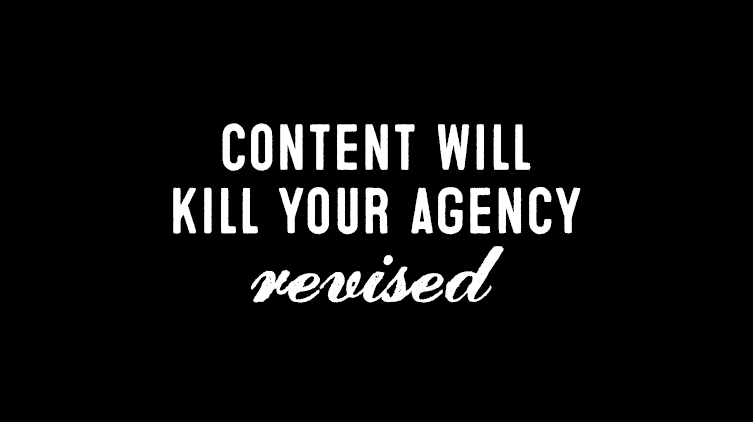On the 12th December 2007, I sat down and wrote a blog post called “content will kill your agency”. Some of you may remember it. That’s eight years ago tomorrow. To my knowledge, content has not killed a single agency.The initial post became a tiny series of three and they caused quite a stir at the time. They’ve long been deleted but I found a printed version and thought it might be interesting to have another look at an old post from a younger and obviously angrier me. Below is the original text from the three posts as I posted them eight years ago. With the exception of one sentence which made no sense whatsoever, the text hasn’t been changed, I’ve just added some additional 2015 notes which appear in italics. Here it is:
Content will kill your agency.
I sense an argument brewing but that’s OK, we can do that here, have an argument and chew things over. No one gets hurt. I’ve been thinking about this for a while and have a series of rough posts that I’m going to shape up and post next week. I was pretty angry/unhappy back in 2007 and most of the stuff I was writing during this period was provocative and almost troll-like. You must also remember that people used to leave comments on blog posts and have proper arguments – the halcyon days of the blogger – plannersphere.
The basic idea is that content will kill the agency that you work for; that the current agency model (or versions of it labelled as new), the work that agencies do, how it’s reviewed and rewarded and the channels that are used to transport it all are doomed. Unless that is, your agency starts creating content. This, very much like the “death of television” theme (which is still holding on in there), was utter nonsense. What did happen of was that agencies got a better at dealing with the consumer as an audience. I would say that Wieden + Kennedy was responsible for pushing the industry in the right direction but we had to wait another two years for them to do that. They made great advertising that looked and felt like something else. The fact that I used the word “doomed” makes me shudder and I’d officially like to apologise for doing so.
This means of course that the agency you work for would have to radically change their business model and completely rethink what it is they do. It means that they would have to walk away from advertising to achieve the same strategic and business results for their clients and therefore revenues and I’m going to try and explain how your agency could do this, and it requires a little more effort than hiring someone to be “head of content”. This is correct but only within the context of the argument. Sadly a great many people have been hired as “head of content”, in fact I know people who carry that title today. They have a ridiculously difficult job because the “content” that was mused over here never really came into play: it seemed possible at the time but it turned out to be too expensive and too time-consuming to implement, so now they manage little snippets of advertising on the cheaper channels, far away from the reach and eyeballs of multi-million audiences. Instagram adverts are not content, they’re adverts.
I’m saying that the company that you’re working for isn’t “future proof”. If you push me, I will probably go as far as to say that the work you do within the agency is meaningless; that your skills, ideas and creativity are being wasted and that, in business terms, your work has no overall effect on the success or failure of the clients you are currently working on because it is void of content. I still stand by the argument that a lot of talent and skill is being wasted in agencies. There are many reasons for this: poor leadership, poor structure, poor processes, lack of vision or being bought by Publicis. But not being “future proof” because of a content void? Pompous rubbish. This was the end of the first post and I suppose I wanted to leave something mischievous to get the conversation going in the comment section (old school blogging!) but the idea that your work is meaningless because it isn’t “editorial” is really very silly. It is, however, deeply disappointing to note that there are an awful lot of consultants, consultancy companies and PR-agencies who are chippy at the face of client budgets by using exactly this kind of argument.
When I sat down to write “content will kill your agency” I had a very clear view of what content is and, obviously, why it will kill the agency you work for and interestingly enough I spotted a whole bunch of other posts that relate in some way to content or to the future of the advertising industry and agencies. Firstly, I have no idea what those posts were so I can’t link to them here. Secondly, I had no idea whatsoever about what content could be – it was more of a gut feeling than anything else and I was kind of making it all up as I went along.
For me, the kind of content that will kill your agency is the kind of content that happens without a brief – nobody has told you or the so called business development people in your agency that they would like to have a specific piece of content. We’re getting closer to the interesting stuff now. Back in 2007 I was experimenting with digital characters and was excited by how much you could achieve on a minimum viable budget. It was an exciting time and the internet was much more fun back then.
I’ve gone on record (albeit in German during one of the German Werbeblogger late night podcasts) and said that every single agency, regardless of size, is capable of producing content that would challenge anything that is currently on the market; whether that be film, television, literature, online, radio, games or events. The skills, ideas and creativity of the people that work within the agencies are, however, being wasted by the people running them and a business model that is increasingly neither meeting the need of “consumers” nor those of the business that are their clients. I still stand by this, especially the bit about poor agency leadership and the skills and talents to be found in an agency. But let us be honest, this is the fundamental flaw in my argument because if you want to write a book, make a film or a game then write a bloody book, make a film or game. If you work in advertising then make great advertising and stop pissing about. Ironically though, the kind of thinking that goes into making these things has been used to make some magnificent advertising.
The kind of content that will kill your agency is briefless content. It will kill your agency because nobody is telling you what to do and you won’t have the mandate to do it. You will have to work it out for yourselves. It will kill your agency because it will be bespoke, unique and without comparison. You will have to fight harder for it, harder than you fight for stuff now.
It will kill your advertising because it’s not advertising, at least not as we know it today.
It’s the 11th December 2015 and content never killed an advertising agency. Television is still going strong too. As with most of the things that were blogged about back then, the predictions, ponderings and absurdities, it was nothing more than a tiny fart in the hot air bubble of an industry that likes to muse about itself. No, content didn’t kill agencies, I got it completely wrong, but it did do something far more damaging, time consuming and wasteful – content has distracted agencies.
Sorry about that.

